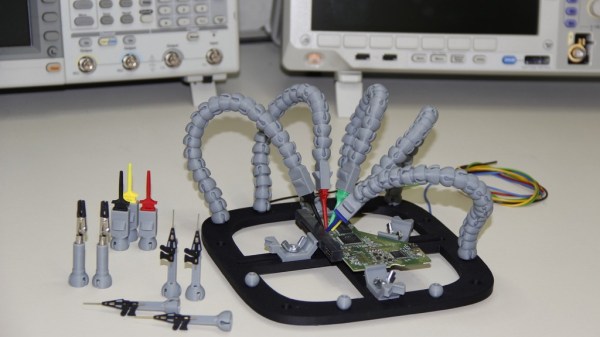Every hacker workbench has one or more of those “helping hand” devices to aid in soldering and assembly. When it comes to testing and debugging though, it could get tricky if you have to start handling test probes while looking at the meter display or fiddling with knobs on the oscilloscope. Sometimes one has to test a board that has just pads for test points. Or maybe you need to directly probe pins on an IC. Checking multiple signals on I2C, SPI, Serial or USB is not too easy with just two hands. [Giuseppe Finizia] is an electronic engineer at the Scientific Investigations Department of the Carabinieri in Italy. He works as a senior analyst in the Electronic Forensics Unit and deal’s with technical investigations on seized electronic devices. To help him in his investigative work, he designed and built a 3D printed PCB workstation with octopus-like tentacles that provides all the additional fingers needed.
The tool is basically a base with adjustable clamps where the test PCB can be fixed. Around the base, up to twelve articulated “tentacles” can be fixed. Various test accessories are attached to the ends of these tentacles – Alligator Clips for holding electronic parts, IC Hook Clip Grabbers, Micro SMD Grabber Test Clips and some others that he is still working on. [Giuseppe] used MOI 3D modeling software to design his device, and the files are available on Thingiverse for download. He does warn that printing all the parts, specially the tentacle units, can be quite tricky on a regular 3D printer. He used a ZORTRAX M200 printer in high resolution mode and Z-HIPS filament. However, it may be easier to just use machine shop flexible coolant pipe for the tentacles. This may require some sort of modification to the base mounts and the business end of the tentacles though.
Thanks to [CFTechno] for sending in this tip.











